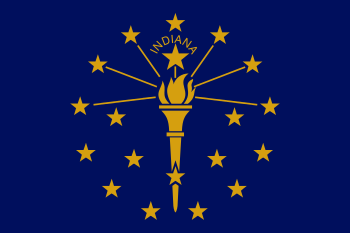Interstate 69 Ohio River Bridge
| Interstate 69 Ohio River Bridge | |
|---|---|
| Carries |
|
| Crosses | Ohio River |
| Locale | Between Evansville, Indiana and Henderson, Kentucky |
| History | |
| Construction cost | ~$800 million |
The Interstate 69 Ohio River Bridge is proposed bridge to carry the planned Interstate 69 (I-69) extension over the Ohio River between Evansville, Indiana and Henderson, Kentucky. The bridge and its approach roadways make up a portion of Segment of Independent utility (SIU) 4 of the I-69 corridor from Michigan to Texas. It will be built approximately 3 miles (4.8 km) upstream of the existing U.S. Route 41 (US 41) bridges.
Description
The design of the I-69 Ohio River Bridge has not yet been defined. A $17 million contract to be awarded by the Indiana Department of Transportation in late 2016 will employ a consulting firm to complete required environmental studies and preliminary design of the bridge. Completion of that work is scheduled for the end of 2020.
The I-69 Ohio River Bridge will be constructed about 3 miles east (upstream) of the existing US-41 bridges linking Evansville, Indiana with Henderson, Kentucky. The northern approach to the bridge will tie into the existing I-69 (formerly I-164) freeway between Green River and Wagenbach Roads east of Evansville. On the Kentucky side, the southern approach is planned to tie into the Pennyrile Parkway near the interchange with the Audubon Parkway. No interchanges are planned on the Indiana approach, while an interchange with US-60 is planned on the Kentucky approach.
Status
Progress Stalls Due to Funding Issues
Environmental studies were initiated in 2001, and a Draft Environmental Impact Statement (DEIS) was issued in March 2004. Environmental studies were suspended when no funding source was identified to build the bridge, which is estimated to cost $1.4 billion.[1][2] Kentucky is responsible for financing two-thirds of the construction cost, and Indiana will finance the remaining third. Indiana has funding available for its portion of the project through the state's Major Moves program, but Kentucky lacks such a program and has yet to identify a funding source for its portion of the construction costs.
The I-69 bridge is competing for funding against other Ohio River bridge projects that Kentucky is attempting to complete, most notably the Ohio River Bridges Project between Louisville and southern Indiana, and the Brent Spence Bridge replacement project between Covington and Cincinnati, Ohio.
The Kentucky Legislature passed House Bill 3 in 2008 that authorizes the state to establish joint bridge authorities with Indiana to finance and build crossings of the Ohio River, specifically with these three megaprojects in mind. While a joint authority has been established to advance work on the Louisville bridges, Kentucky officials have opted to wait on establishing a similar authority for the I-69 bridge until construction on the Louisville bridges is underway.[3]
Renewed Effort to Complete the I-69 Bridge
With the completion of SIU-5 in Kentucky in 2015, and with I-69 connected to Indianapolis via SR-37 in Indiana (also in 2015), both states have made completing the Ohio River Bridge a top priority. On June 30, 2016, Indiana Governor Mike Pence and Kentucky Governor Matt Bevin announced an agreement to resume environmental studies and develop a funding strategy to complete the Ohio River Bridge and its approaches. Indiana will contribute $17 million to restart and lead the environmental studies that will culminate in an approved Environmental Impact Statement (EIS) and Record of Decision (ROD) that will allow construction to begin. Environmental studies are expected to take about 3 years to complete, with right-of-way acquisition and construction expected to begin thereafter. Kentucky has committed over $43 million in its 2016 Six Year Highway Plan for design and right-of-way acquisition for the bridge.[4][5] Revisions to the Ohio River Bridge concept have helped reduce its estimated cost from the initial estimate of $1.4 billion to $845 million. Both states are considering a combination of tolls, private sector investment, and traditional funding sources to finance construction of the bridge.
See also
-
 Bridges portal
Bridges portal -
 Kentucky portal
Kentucky portal -
 Indiana portal
Indiana portal
References
- ↑ I-69 Project Status, Hoosier Voices for I-69, November 26, 2010
- ↑ Kentucky I-69 Status, C-LINK Website, November 26, 2010
- ↑ Advocate optimistic about I-69: State moving ahead with construction despite bridge issue, Evansville Courier-Press, August 11, 2010
- ↑ Pence, Bevin sign agreement to ramp up plans for I-69 bridge, Evansville Courier Press, June 30, 2016
- ↑ 2016 Six Year Highway Plan, Kentucky Transportation Cabinet, Jan 26, 2016